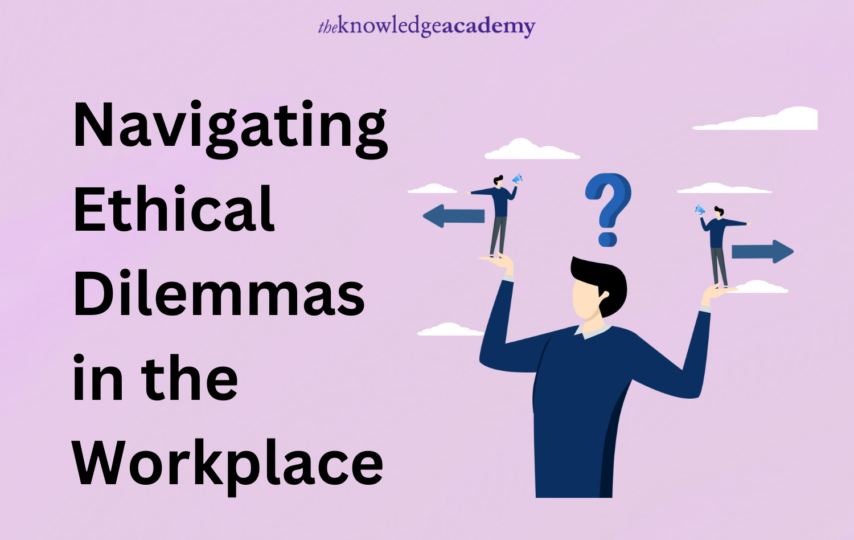Specifically for individuals seeking professional growth through courses like the CMI Level 5 Course, navigating ethical dilemmas in the workplace is a vital ability. Knowing and following the Code of Ethics and Code of Conduct of a corporation will help staff members to make the correct judgements under difficult circumstances. This blog will explore feasible measures for ethical dispute resolution so that you keep integrity and uphold the principles of your company, therefore promoting a positive and ethical workplace.
The Role of a Code of Ethics
A code of ethics provides direction for behaviour and decision-making inside a company. It lays forth the values and ideas the company supports and offers a structure for handling moral problems. An effectively written code of ethics will enable staff members to identify and negotiate moral problems properly.
Steps to Navigate Ethical Dilemmas
Identify the Ethical Issue
Clearly defining the present ethical problem is the first step in overcoming one. This entails realising the contradicting values and recognising the possible outcomes of different actions. It is very important to take the time to carefully look at the situation.
Gather Relevant Information
Gather all the information you need to make a smart choice. This includes knowing the facts of the matter, the engaged parties, and the possible effects of certain acts. Understanding the complete picture is crucial for a more effective assessment of the alternatives.
Consult the Code of Ethics
Check the organisation’s code of ethics to see if it has any advice. Many times, the code of ethics has certain clauses meant to define the proper line of action. Should the code fail to directly handle the matter, it could nevertheless provide pertinent ideas for further thought.
Evaluate the Options
Consider the potential actions you could take and evaluate them against ethical principles. This entails considering how each choice fits the company’s ideals and repercussions. Asking yourself questions like which one promotes justice can be beneficial. Which choice honours everyone’s rights, including those of the interested parties?
Seek Advice
Ask reliable coworkers, managers, or the human resources division when in doubt. Discussing the conundrum with others could provide fresh angles and enable you to consider elements you might have missed. It also guarantees openness in the decision-making process.
Decide
After weighing all options and consulting experts, decide according to the best available facts and ethical standards. Make sure your choice complements the company’s code of conduct and principles.
Take Responsibility
After a decision is taken, own the result. Prepare to defend and explain your choice to others. Assuming accountability shows respect for moral guidelines.
Reflect and Learn
Once the problem is solved, consider the procedure and the result. Reflect on what you have discovered and how you could use this information to face subsequent moral dilemmas. Good ethical judgement depends on ongoing education and development.
Common Ethical Dilemmas in the Workplace
Conflicts of Interest
Workers could find themselves in circumstances whereby their personal interests run contrary to their professional obligations. One example of a conflict of interest is hiring a family member or taking gifts from a source.
Confidentiality
Maintaining confidentiality is vital, but there can be challenges when secret material must be disclosed to prevent harm. It can be difficult to balance between the obligation to uphold privacy and the public interest’s demand for intervention.
Resource Allocation
Figuring out how to fairly distribute limited resources can be hard from an ethical point of view. For instance, deciding which initiatives to support or how to split bonuses calls for serious thought of justice and equity.
Whistleblowing
Notifying an organisation of shady behaviour can be hard. Whistleblowers may fear retaliation or damaging relationships with colleagues. Negotiating this dilemma calls both bravery and a dedication to the greater good.
Conclusion
Although unavoidable in the workplace, ethical dilemmas can be resolved satisfactorially with the correct strategy. Employees and managers can maintain ethical standards and help to create a good organisational culture by spotting the ethical issue, compiling pertinent data, reviewing the code of ethics, assessing choices, getting counsel, deciding what to do, and so assuming responsibility. Reflecting on and learning from past encounters improves one’s capacity to manage upcoming problems even more. Finally, commitment to ethics develops success, integrity, and trust in the job.
Gain confidence as a leader through The Knowledge Academy courses.








